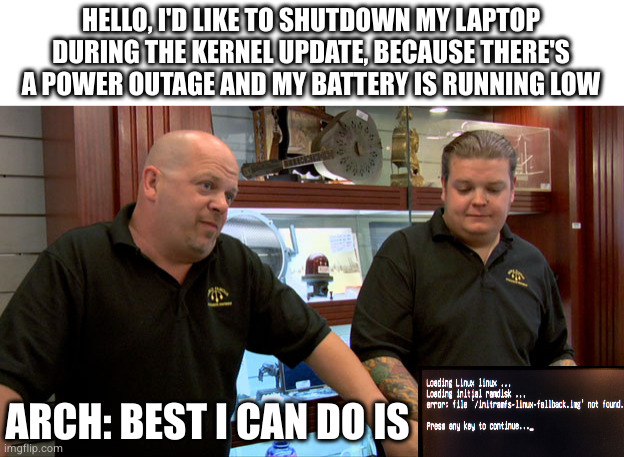this post was submitted on 04 Aug 2024
321 points (87.9% liked)
linuxmemes
20880 readers
4 users here now
I use Arch btw
Sister communities:
- LemmyMemes: Memes
- LemmyShitpost: Anything and everything goes.
- RISA: Star Trek memes and shitposts
Community rules
- Follow the site-wide rules and code of conduct
- Be civil
- Post Linux-related content
- No recent reposts
Please report posts and comments that break these rules!
founded 1 year ago
MODERATORS
you are viewing a single comment's thread
view the rest of the comments
view the rest of the comments

Wait if the power is out, how do they have Internet to load new packages? Something doesn't make sense here
It first downloads all packages from net, then it proceed totally offline starting by verifying downloaded files, signatures, extracting new packages and finally rebuilding initramfs.
Because arch is replacing the kernel and inittamfs in-place there is a chance that it will not boot if interrupted.
This issue was long resolved on other distro.
One way to mitigate it is by having multiple kernels (like LTS or hardened) that you can always pick in grub if the main one fail.
This issue was solved on Slackware in 1993.
It installs a "huge" kernel that contains all drivers to run on almost any hardware by default, alongside the "generic" kernel with only the modules you need. If the generic kernel fails to boot, you always have the backup, which is known to work, cause it's the kernel you first boot into after installation.
I'm not familiar with slackware but why is specific kernel called generic, while generic one is not called generic? I'm puzzled
I have no idea either.
Edit: Did some reading. "Linux-generic" is just the name of the linux kernel that is used in most computers (as opposed to Linux-realtime, which is the only other Linux kernel that's still relevant).
Yeah but how can you download without internet
(No internet =} no download = no failure
You can even host repo mirror locally, that will still work without internet ;)
How to have internet without power?
Cable internet tends to stay online even if your power is out. You'd need a battery backup for your modem/router, but it is possible to stay online. Houses can be clever like that, almost all of your utilities will partially work, even when service is interrupted.
That depends on the ISP having backup batteries for their equipment. It will usually only last a couple of hours. 5G will usually stay up for a few days. For longer outages, you will need satellite internet and lots of fuel for your generator.
Cellular data
My router has a 5G backup connection and a battery. Light could be out and I'd still have internet. So, yeah, it's possible :P
But if the power goes out isn't the stuff from your ISP/mobile carrier out too?
Nah, cell towers often have some kind of backup power good for a couple hours or more, at least in the city where I am. I think I once had an outage last 3 days when a tornado wrecked the local transformer station, and still had cell service the entire time.
Average Linux solution.
"Got an emergency? It's so EZ. Just open up the terminal and copy/paste [long string of unreadable text]. Btw fuck windows."
Yea as opposed to the windows method of “just open regedit and navigate 8 folders below HKEY_CURRENT_USER to change some ambiguous system variable in hex” lmao
I’ll take editing a text file in /etc/ for my configuration any day